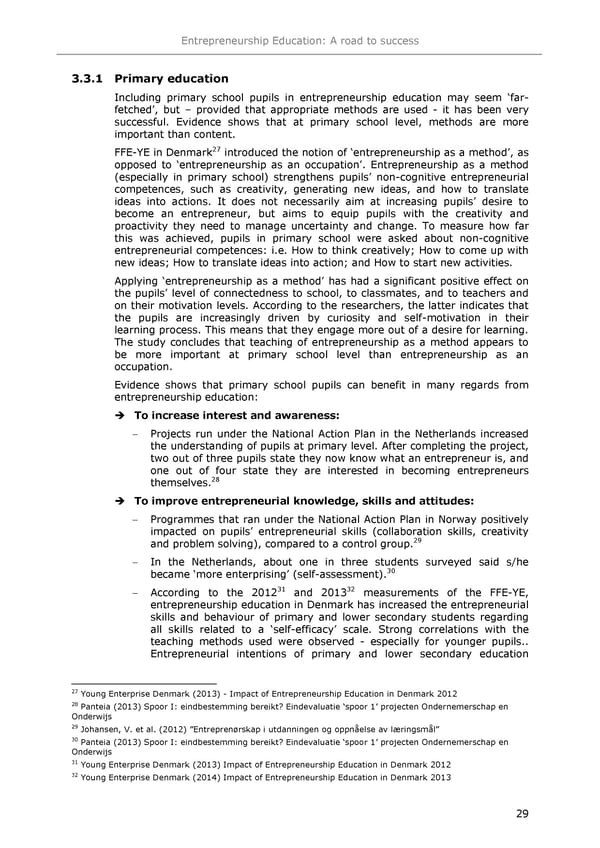Entrepreneurship Education: A road to success 3.3.1 Primary education Including primary school pupils in entrepreneurship education may seem 8far- fetched9, but 3 provided that appropriate methods are used - it has been very successful. Evidence shows that at primary school level, methods are more important than content. 27 FFE-YE in Denmark introduced the notion of 8entrepreneurship as a method9, as opposed to 8entrepreneurship as an occupation9. Entrepreneurship as a method (especially in primary school) strengthens pupils9 non-cognitive entrepreneurial competences, such as creativity, generating new ideas, and how to translate ideas into actions. It does not necessarily aim at increasing pupils9 desire to become an entrepreneur, but aims to equip pupils with the creativity and proactivity they need to manage uncertainty and change. To measure how far this was achieved, pupils in primary school were asked about non-cognitive entrepreneurial competences: i.e. How to think creatively; How to come up with new ideas; How to translate ideas into action; and How to start new activities. Applying 8entrepreneurship as a method9 has had a significant positive effect on the pupils9 level of connectedness to school, to classmates, and to teachers and on their motivation levels. According to the researchers, the latter indicates that the pupils are increasingly driven by curiosity and self-motivation in their learning process. This means that they engage more out of a desire for learning. The study concludes that teaching of entrepreneurship as a method appears to be more important at primary school level than entrepreneurship as an occupation. Evidence shows that primary school pupils can benefit in many regards from entrepreneurship education: To increase interest and awareness: Projects run under the National Action Plan in the Netherlands increased the understanding of pupils at primary level. After completing the project, two out of three pupils state they now know what an entrepreneur is, and one out of four state they are interested in becoming entrepreneurs 28 themselves. To improve entrepreneurial knowledge, skills and attitudes: Programmes that ran under the National Action Plan in Norway positively impacted on pupils9 entrepreneurial skills (collaboration skills, creativity 29 and problem solving), compared to a control group. In the Netherlands, about one in three students surveyed said s/he 30 became 8more enterprising9 (self-assessment). 31 32 According to the 2012 and 2013 measurements of the FFE-YE, entrepreneurship education in Denmark has increased the entrepreneurial skills and behaviour of primary and lower secondary students regarding all skills related to a 8self-efficacy9 scale. Strong correlations with the teaching methods used were observed - especially for younger pupils.. Entrepreneurial intentions of primary and lower secondary education 27 Young Enterprise Denmark (2013) - Impact of Entrepreneurship Education in Denmark 2012 28 Panteia (2013) Spoor I: eindbestemming bereikt? Eindevaluatie 8spoor 19 projecten Ondernemerschap en Onderwijs 29 Johansen, V. et al. (2012) =Entreprenørskap i utdanningen og oppnåelse av læringsmål= 30 Panteia (2013) Spoor I: eindbestemming bereikt? Eindevaluatie 8spoor 19 projecten Ondernemerschap en Onderwijs 31 Young Enterprise Denmark (2013) Impact of Entrepreneurship Education in Denmark 2012 32 Young Enterprise Denmark (2014) Impact of Entrepreneurship Education in Denmark 2013 29
 Entrepreneurship Education Page 32 Page 34
Entrepreneurship Education Page 32 Page 34